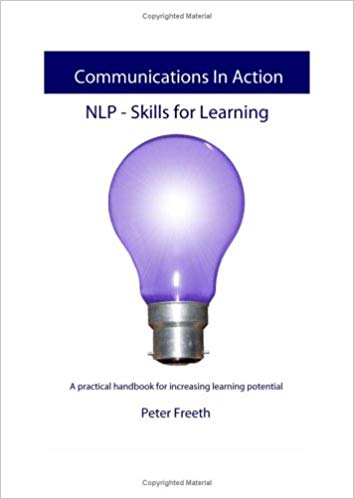
|
FreeComputerBooks.com
Links to Free Computer, Mathematics, Technical Books all over the World
|
|
- Title NLP - Skills for Learning
- Author(s) Peter Freeth
- Publisher: CGW (June 1, 2009)
- Paperback: 220 pages
- eBook: PDF (178 pages)
- Language: English
- ISBN-10: 095457480X
- ISBN-13: 978-0954574802
- Share This:

|
This is a book about the application of NLP (Neuro Linguistic Programming) in teaching, training and education. It is a book about NLP for trainers and a general introduction to NLP - all in one. If you're an experienced trainer or presenter and you want to find out, easily, how NLP can help you to transform your skills then this book is for you. This book is written from the outset to both teach and demonstrate the application of NLP as a learning tool.
There are ready made exercises for you and many ideas and applications that you can use right away. NLP - Skills for Learning is the ideal NLP trainer's book because it is written from many years experience both in training NLP at the Practitioner and Master Practitioner level, but also in applying NLP in business applications training.
Whilst this book was originally written for trainers, it also makes an ideal introduction to NLP for any reader and many people have bought it because it covers the fundamentals of NLP in way that is easy to read, understand and apply.
About the Authors- Peter Freeth has over twenty years' experience in using NLP to improve training in subjects from leadership and sales through to customer service and technical training. He has been developing innovative NLP applications for over 20 years and has delivered programs for a number of leading UK training organisations as well as bespoke corporate programs in the UK and world wide.
- Computational Linguistics and Natural Language Processing
- Machine Learning
- Succinctly Free eBooks Series
 Similar Books:
Similar Books:
-
 Representation Learning for Natural Language Processing
Representation Learning for Natural Language Processing
This book provides an overview of the recent advances in representation learning theory, algorithms, and applications for natural language processing (NLP), ranging from word embeddings to pre-trained language models.
-
 Foundation Models for Natural Language Processing
Foundation Models for Natural Language Processing
This open access book provides a comprehensive overview of the state of the art in research and applications of Foundation Models and is intended for readers familiar with basic Natural Language Processing (NLP) concepts.
-
 Speech and Language Processing (Dan Jurafsky, et al)
Speech and Language Processing (Dan Jurafsky, et al)
This text takes an empirical approach to the subject, based on applying statistical and other machine-learning algorithms to large corporations. It describes a unified vision of speech and language processing. Emphasis is on practical and scientific applications.
-
 Linguistics for the Age of AI (Marjorie McShane, et al)
Linguistics for the Age of AI (Marjorie McShane, et al)
This book summarizes an exciting approach to knowledge-rich natural language understanding, in the context of language - using AI agents. Anyone interested in building cognitive systems that use language should read this book.
-
 Computational Linguistics: Models, Resources, Applications
Computational Linguistics: Models, Resources, Applications
This comprehensive reference work provides an overview of the concepts, methodologies, and applications in computational linguistics and natural language processing (NLP). It will be of interest and practical use to a wide range of linguists.
-
 The Unicode Cookbook for Linguists (Steven Moran, et al)
The Unicode Cookbook for Linguists (Steven Moran, et al)
This book is a practical guide to Unicode for linguists, and programmers, who work with data in multilingual computational environments. It describes a formal specification of orthography profiles and provide recipes using open source tools.
-
 Programming with Unicode (Victor Stinner)
Programming with Unicode (Victor Stinner)
This book explains how to sympathize with Unicode, and how you should modify your program to avoid most, or all, issues related to encodings and Unicode. It offers specific guidance on integrating Unicode with other technologies.
-
 The Unicode Standard (The Unicode Consortium)
The Unicode Standard (The Unicode Consortium)
This is the one book all developers using Unicode must have. The core specification gives the general principles, requirements for conformance, and guidelines for implementers. The code charts show representative glyphs for all the Unicode characters.
-
 Analyzing Linguistic Data: Introduction to Statistics using R
Analyzing Linguistic Data: Introduction to Statistics using R
A straightforward introduction to the statistical analysis of language, designed for those with a non-mathematical background. Using the leading statistics programme 'R'. Suitable for all those working with quantitative language data.
-
 Mathematical Linguistics (Andras Kornai)
Mathematical Linguistics (Andras Kornai)
This book introduces the mathematical foundations of linguistics to computer scientists, engineers, and mathematicians interested in natural language processing (NLP). It presents linguistics as a cumulative body of knowledge from the ground up.
-
 How Language Works: The Cognitive Science of Linguistics
How Language Works: The Cognitive Science of Linguistics
This book offers general readers a personal tour of the intricate workings of language. It will focus on a narrow range of topics and themes; there will be no pretense of covering the field in anything like a complete fashion.
-
 Essentials of Linguistics (Catherine Anderson)
Essentials of Linguistics (Catherine Anderson)
This book is about the core areas of theoretical linguistics (phonetics, phonology, morphology, syntax, and semantics), supplemented with discussion of psycholinguistic and neurolinguistic findings. It is suitable for any beginning learner of linguistics.
-
 Syntactic Theory: A Formal Introduction (Ivan A. Sag, et al)
Syntactic Theory: A Formal Introduction (Ivan A. Sag, et al)
This is a textbook that makes it truly fun to teach introductory syntax. It is thoroghly data-driven and teaches the student to pay attention to empirical details and to find linguistic patterns and explanations for them.





